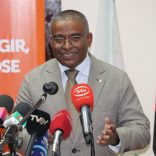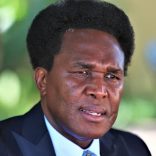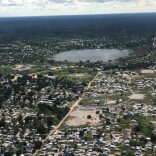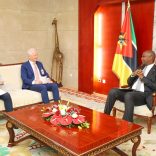Mozambique: Minister warns against arrogance among health workers - Watch
Mozambique elections | Constitutional Council: Two judges dissent – AIM report

Photo: Twitter / @TxekaMoz
Mozambique’s Constitutional Council, the country’s highest body in matters of constitutional and electoral law, on Monday validated the results of the general and provincial elections held on 15 October by five votes to two.
The two dissenting judges, Manuel Franque and Albino Nhacassa, both appointed to the Council by the parliamentary group of the main opposition party, Renamo, argued, in a written dissent, that, while the vote had been free, in the sense that the voters “made their choice in accordance with the dictates of their conscience”, the same could not be said of the count and tabulation of the votes.
“Various irregularities were pointed out, both by the competing parties and their representatives and by the accredited observers”, they said. “This puts the transparency of the elections into crisis”.
“Unfortunately, this is not an isolated situation”, they added. “It is repeated from election to election”.
This led the two judges to conclude “that the irregularities which occurred in these elections are the inherent consequence of the organisation, administration and management of our electoral processes”.
Reading out the majority opinion, the Council’s chairperson, Lucia Ribeiro, said the irregularities “did not substantially influence the results of the elections”.
Of the electoral crimes that had come to the Council’s notice there had been 57 cases during the voter registration, including attempts to register twice and falsification of documents. There were 220 crimes reported during the election campaign, mostly to do with destroying opponents’ election propaganda, but also including physical assaults.
On voting day itself, 65 electoral crimes were reported. These including voting twice, trying to prevent others from voting, disturbances at the polling stations, ballot box stuffing, and propaganda after the end of the election campaign. Ribeiro did not break the figure down any further. In particular, she did not indicate how many people were caught trying to slip extra votes into the ballot boxes.
During the polling station count, she said, four crimes were reported of fraud, and disturbing the count proceedings.
But one delicate matter is still in the hands of the Public Prosecutor’s Office. This is the impossible figures given by the National Elections Commission (CNE) for the voter registration in the southern province of Gaza.
The CNE’s executive body, the Electoral Administration Technical Secretariat (STAE) set a target for voter registration in Gaza of 1.14 million, and the final number of voters supposedly registered in the province was 1,166,011.
But this is much higher than the number of adults of voting age (18 and above) found in the province by the National Statistics Institute (INE) during the population census of 2017. The census counted the number of people in Gaza at 1,422,460. At a population growth rate in the province of 1.2 per cent, the projected size of the Gaza population in 2019 is 1,456,599.
The INE says that, of this figure, 836,581 people are aged 18 and above (57.4 per cent of the total), and are thus entitled to register as voters. But the CNE/STAE figure is larger by almost 330,000 – clearly impossible.
The key difference between the INE and CNE/STAE is that the INE is a body of skilled professional statisticians, whereas the electoral bodies are deeply politicised. At district, provincial and national levels, the CNE and STAE are filled with many hundreds of people appointed by Frelimo, Renamo and the Mozambique Democratic Movement (MDM).
Renamo called on the Public Prosecutor’s Office to take legal action against those members of the CNE who had approved the voter registration figures.
Ribeiro said the Public Prosecutor had decided there was not enough evidence to prosecute anyone in the CNE or STAE over the registration. However “the data from the population census and from the voter registration in Gaza are being analysed by specialists”.
She did not say what might happen if the specialists find that the census is right, and the CNE is wrong. Parliamentary seats are allocated to provinces in accordance with the number of registered voters living there. The number of seats for Gaza (all taken by Frelimo) rose by eight because of the extra 330,000 people discovered by the CNE but unknown to the population census.
Both main opposition parties regard the election results as fraudulent. Renamo boycotted the Monday ceremony, while the MDM election agent, Jose Manuel de Sousa, showed up, but told reporters he regarded the results as “a huge erasure in the development of democracy in Mozambique”.
Sousa said there is an enormous gap between the electoral legislation and what happens on the ground during elections.
“What was not said here (i.e. by Ribeiro) was what happened on election day when the monitors and polling station staff appointed by opposition parties were expelled from the polling stations. That wasn’t mentioned”, he declared.
“We all know that the law is very pretty, but what happens in practice is not in line with either the Constitution or the electoral law”, he added.
But the MDM has no intention of boycotting the new parliament, he said, even though the number of MDM deputies has been cut from 17 to six.
“Our numbers are reduced because the fraud took on proportions never seen before”, he said. “But we shall continue to do our work, because we have parliamentary representation, and naturally we are available to continue working in order to find ways of continuing the development of this country”.













Leave a Reply
Be the First to Comment!
You must be logged in to post a comment.
You must be logged in to post a comment.